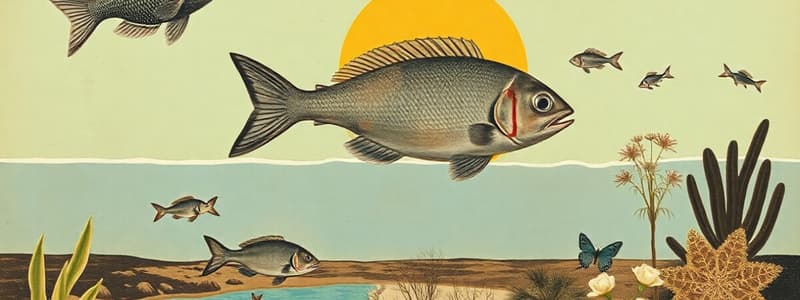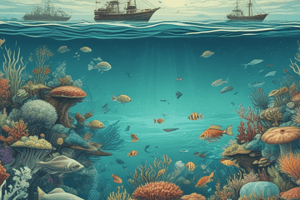Podcast
Questions and Answers
What is a significant consequence of disruptions at one trophic level in a marine food web?
What is a significant consequence of disruptions at one trophic level in a marine food web?
- It has no effect on keystone species.
- It creates an imbalance at multiple trophic levels. (correct)
- It solely impacts bottom-dwelling organisms.
- It only affects the species directly involved.
How does competition for space influence marine organisms?
How does competition for space influence marine organisms?
- It affects the distribution and abundance of species. (correct)
- It only concerns predators and not prey.
- It determines reproductive rates of species.
- It has no significant impact on the ecosystem.
Why is understanding trophic interactions crucial for fisheries management?
Why is understanding trophic interactions crucial for fisheries management?
- It helps in determining seasonal fishing patterns.
- It reduces competition among fish species.
- It is essential for sustainable practices. (correct)
- It allows for predicting fish migration routes.
What role do keystone species play in marine ecosystems?
What role do keystone species play in marine ecosystems?
How does knowledge of biotic interactions contribute to understanding pollution impacts on marine ecosystems?
How does knowledge of biotic interactions contribute to understanding pollution impacts on marine ecosystems?
Which type of competition occurs between different species in marine ecosystems?
Which type of competition occurs between different species in marine ecosystems?
What role do predators play in marine ecosystems?
What role do predators play in marine ecosystems?
Which type of symbiotic relationship benefits one species while the other is neither helped nor harmed?
Which type of symbiotic relationship benefits one species while the other is neither helped nor harmed?
How can parasitism affect marine organisms?
How can parasitism affect marine organisms?
What impact does herbivory have in marine ecosystems?
What impact does herbivory have in marine ecosystems?
What can cause disease outbreaks in marine organisms?
What can cause disease outbreaks in marine organisms?
What type of relationship exists between cleaner shrimps and larger fish?
What type of relationship exists between cleaner shrimps and larger fish?
What impact do changes in predator populations have on marine ecosystems?
What impact do changes in predator populations have on marine ecosystems?
Flashcards
Food Web Complexity
Food Web Complexity
The interconnectedness of different feeding levels within a marine ecosystem, where organisms rely on each other as food sources.
Competition for Space
Competition for Space
Marine organisms compete for limited resources like space on reefs, substrates or burrows.
Ecological Interactions
Ecological Interactions
These processes influence the species diversity and overall structure of marine communities.
Conservation
Conservation
Signup and view all the flashcards
Fisheries Management
Fisheries Management
Signup and view all the flashcards
Competition in marine ecosystems
Competition in marine ecosystems
Signup and view all the flashcards
Intraspecific competition
Intraspecific competition
Signup and view all the flashcards
Interspecific competition
Interspecific competition
Signup and view all the flashcards
Predation in marine ecosystems
Predation in marine ecosystems
Signup and view all the flashcards
Symbiosis in marine ecosystems
Symbiosis in marine ecosystems
Signup and view all the flashcards
Commensalism in marine ecosystems
Commensalism in marine ecosystems
Signup and view all the flashcards
Parasitism in marine ecosystems
Parasitism in marine ecosystems
Signup and view all the flashcards
Herbivory in marine ecosystems
Herbivory in marine ecosystems
Signup and view all the flashcards
Study Notes
Biotic Factors in Marine Ecosystems
-
Competition: Marine organisms compete for limited resources like food, space, and mates.
- Intraspecific competition occurs between members of the same species.
- Interspecific competition occurs between different species.
- Competition significantly impacts population size and distribution, influencing community structure.
- Examples include corals competing for reef space, or fish competing for prey.
-
Predation: Predators hunt and consume prey, affecting prey populations.
- Predator-prey relationships are crucial for ecological balance.
- Predator absence/presence significantly alters prey abundance.
- Predator population changes (e.g., overfishing) disrupt entire food webs.
- Examples include sharks feeding on fish, and larger fish hunting smaller ones.
-
Symbiosis: Close interactions between species.
- Mutualism: Both species benefit (e.g., cleaner shrimp and fish).
- Commensalism: One benefits, the other is unaffected (e.g., barnacles on whales).
- Parasitism: One benefits (parasite), the other is harmed (host).
- Examples include various worms, bacteria, and fungi.
- Symbiotic relationships shape marine communities.
-
Parasitism: A parasite derives nourishment from a host, often harming it.
- Parasites impact host health and survival.
- Parasitism influences host population dynamics and distribution.
- Examples include marine worms and single-celled organisms affecting fish and invertebrates.
-
Herbivory: Herbivores consume plants or algae.
- Herbivores affect plant abundance and distribution.
- Herbivory maintains ecosystem balance by preventing excessive plant growth.
- Examples include sea urchins grazing kelp, and sea turtles consuming seagrass.
-
Disease: Pathogens cause illness and death in marine organisms.
- Pollution, temperature/salinity changes influence disease outbreaks.
- Disease outbreaks can decimate populations.
- Examples include bacteria and viruses affecting shellfish and finfish.
-
Food Web Complexity: Interconnected trophic levels in a marine ecosystem.
- Food webs are intricate, including numerous species and trophic levels.
- Disruptions at one level impact the entire food web.
- Keystone species abundance changes significantly affect the ecosystem.
-
Competition for Space: Marine organisms compete for space on reefs, substrates, or burrows.
- Limited space influences distribution and abundance of organisms.
-
Ecological Interactions: These processes dictate species diversity and community structure in marine environments.
Implications of Understanding Biotic Factors
- Conservation: Understanding biotic factors is crucial for effective conservation strategies.
- Fisheries Management: Understanding trophic interactions is vital for sustainable fisheries.
- Pollution Impacts: Biotic interactions help predict pollution impacts on marine ecosystems.
- Climate Change Effects: Biotic factors determine how marine life reacts to environmental changes.
- Ecosystem Resilience: Identifying keystone species and crucial interactions predicts ecosystem resilience under pressure.
Studying That Suits You
Use AI to generate personalized quizzes and flashcards to suit your learning preferences.




